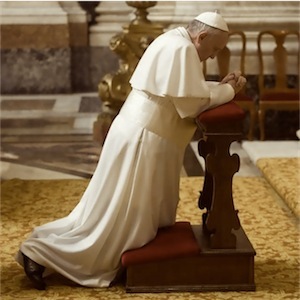
 IKE THE WALL OF JERICHO, so it seems the world is crumbling. Certainly, there is always unrest in the world. We are accustomed to the point of indifference. But from most any perspective, there is currently a heightened degree of unspeakable human tragedy in too many parts of the world. The persecution and suffering is heartbreaking and deeply sobering. Even Pope Francis in his August 13th letter to the United Nations calls for unprecedented concrete action:
IKE THE WALL OF JERICHO, so it seems the world is crumbling. Certainly, there is always unrest in the world. We are accustomed to the point of indifference. But from most any perspective, there is currently a heightened degree of unspeakable human tragedy in too many parts of the world. The persecution and suffering is heartbreaking and deeply sobering. Even Pope Francis in his August 13th letter to the United Nations calls for unprecedented concrete action:
I write to you, Mr Secretary-General, and place before you the tears, the suffering and the heartfelt cries of despair of Christians and other religious minorities of the beloved land of Iraq…I encourage all the competent organs of the United Nations, in particular those responsible for security, peace, humanitarian law and assistance to refugees, to continue their efforts in accordance with the Preamble and relevant Articles of the United Nations Charter.
This lends somber perspective.
How important is the liturgy in light of grave events? A phrase that is often heard is that following the rubrics is like “rearranging the chairs on the Titanic.” At times this could ring true. In 2013, Pope Francis famously likened the Church to a “…field hospital after battle. It is useless to ask a seriously injured person if he has high cholesterol and about the level of his blood sugars! You have to heal his wounds. Then we can talk about everything else. Heal the wounds, heal the wounds….” The Pope understood that the Church is in crisis and the priority is to “heal wounds and to warm the hearts of the faithful.” (Interview with Antonio Spadaro, S.J.)
So it is an easy leap to conclude that the mass or its finer details are insignificant or may be discarded. While I do not believe for a moment this is what Pope Francis was getting at, here enters the paradox. When the soul in distress, so terrified that the only possibility is to give oneself over to a power greater than oneself, particular words and form rarely matter. Yet, the mass is our greatest prayer. Such times demand even greater reverence.
 N THE FACE OF EVIL AND UNSPEAKABLE SUFFERING, action is required from the Christian soul. This action not only includes but demands prayer. For those of us who are powerless to assist except to pray, our prayer must be with earnest intent. In doing so, we do well to remember this: following the rubrics or enacting the GIRM is not the ends. It is a means towards which we find immediacy with God in prayer and therefore healing for humanity. The rubrics and the GIRM are in service to the celebration of the Eucharist. Their importance lies in what they achieve. This is why we do not dismiss them or render them unimportant. Lex Orandi, Lex Credendi, Lex Vivendi demands that our prayer has a direct connection with how we live out our lives. We pray as we believe, and therefore live.
N THE FACE OF EVIL AND UNSPEAKABLE SUFFERING, action is required from the Christian soul. This action not only includes but demands prayer. For those of us who are powerless to assist except to pray, our prayer must be with earnest intent. In doing so, we do well to remember this: following the rubrics or enacting the GIRM is not the ends. It is a means towards which we find immediacy with God in prayer and therefore healing for humanity. The rubrics and the GIRM are in service to the celebration of the Eucharist. Their importance lies in what they achieve. This is why we do not dismiss them or render them unimportant. Lex Orandi, Lex Credendi, Lex Vivendi demands that our prayer has a direct connection with how we live out our lives. We pray as we believe, and therefore live.
Perhaps now is a good time to pray as we never have before.
“In the same way, the Spirit too comes to the aid of our weakness; for we do not know how to pray as we ought, but the Spirit itself intercedes with inexpressible groanings.” – Romans 8:26

